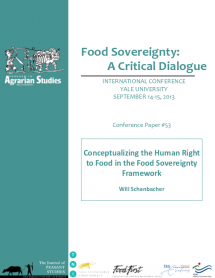Conceptualizing the Human Right to Food in the Food Sovereignty Framework
Rather than contextualizing access to food as a failure on the part of affluent countries to provide a framework for securing the right to food, affluent countries (and their citizens) should recognize how we are actively exacerbating global hunger and malnutrition.

Authors
In this paper, I draw from the theory of human rights articulated by Tomas Pogge. Theorizing in the larger context of global poverty and inequality, Pogge makes an important distinction between positive and negative rights, and the duties that arise from them. More specifically, Pogge argues we should consider human rights in a way that transcends the conventional debate between positive and negative rights and duties. Rather than contextualizing access to food as a failure on the part of affluent countries to provide a framework for securing the right to food, affluent countries (and their citizens) should recognize how we are actively exacerbating global hunger and malnutrition. Accepting this premise, implicates all of us who are complicit in creating and perpetuating any institutional order that denies global farmers the freedom from poverty, hunger and malnutrition. Perhaps more importantly this framework avoids some of the ethical conundrums associated with positive rights, namely, from whom (governments, charities, multilaterals, etc.) do the global poor, hungry, and malnourished demand the right to food. This paper argues for a more minimal sense of duty on the part of affluent countries. Instead we focus on our negative duty to not impose upon global farmers institutions and social structures that deny them the freedom to chose how they wish to organize their own local communities’ efforts to achieve food self-sufficiency.
Will Schanbacher is Instructor of Religious Studies, University of South Florida Author of The Politics of Food: The Global Conflict between Food Security and Food Sovereignty (Praeger, 2010), Will Schanbacher’s research interests include, ethics and the global food system, religion and food, human rights and theories of justice, and liberation theologies. He is currently working on an edited volume tentatively titled, The Global Food System: Issues and Solutions (Praeger).
Food Sovereignty: a critical dialogue, 14 - 15 September, New Haven.